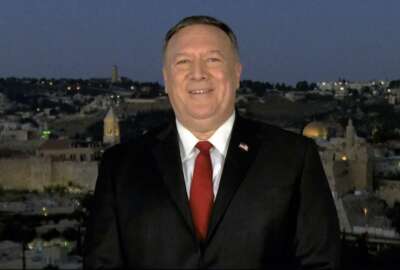

The Hatch Act prohibits federal employees from participating in political activities while on the job, but some have called for reforms to the 1939 law.
As Election Day approaches this Nov. 8, there are several nuances in the Hatch Act that could impact federal employees.
But the exact regulations that a federal employee needs to follow under the law also depend on the individual’s position in government.
Most federal executive branch employees, according to the Office of Special Counsel, the agency that oversees the act, are in the “less restricted” category under the Hatch Act. The category means they can take an “active part” in political management or campaigns.
There are some caveats, though. For example, less restricted federal employees cannot use their official titles or positions during political activities. They also cannot distribute or display political campaign materials, either in a physical office space or anytime that they’re on duty. And they cannot participate in political activities in the workplace or while on duty elsewhere.
The rules can get even more complicated. Federal employees, for instance, can attend political fundraising events, but they can’t host a fundraiser, or accept a donation for a political party. OSC has an entire list of “dos and don’ts” for less restricted feds on its website.
Senate-confirmed political appointees are also classified as less restricted, but there are not set consequences for certain political appointees who violate the law. They also have some exemptions — they are allowed, for instance, to engage in political activities while on duty.
Passed in 1939, the Hatch Act generally prohibits federal employees from taking part in certain political activities. Agencies can also place additional restrictions on their employees when it comes to political activities.
Other than the less restricted group, there is also a group of “further restricted” employees set under the Hatch Act. Employees in that group are generally employed in intelligence and enforcement-type agencies, including the FBI, CIA, Federal Election Commission and National Security Agency, to name a few. Career members of the Senior Executive Service, administrative law judges, administrative appeals judges and contract appeals board members, are also all on the further restricted list.
That group has more rules to follow under the Hatch Act. Further restricted employees can’t campaign for or against a candidate, host political events or make political campaign contributions while on duty.
The differences are also somewhat nuanced between the two classifications. For example, less restricted employees may join, be active and hold office in partisan groups, while further restricted employees may only join partisan groups.
The COVID-19 pandemic initially raised questions, too, about how the Hatch Act applied to telework and remote work spaces. OSC released guidance in 2020 saying that the same Hatch Act rules apply to virtual meetings as they would to in-person meetings.
“Employees should not wear a campaign t-shirt or hat while participating in a work-related video conference call, and they should ensure that any partisan materials, like campaign signs or candidate pictures, are not visible to others during the call,” the OSC guidance said.
Similarly, OSC said the same rules apply on social media platforms. Federal employees may not post or comment on political content on social media while on duty. Interacting with political endorsements on social media is only OK when an employee is not working, according to OSC.
If federal employees violate the Hatch Act, they may face potential firing, grade reduction or debarment. They may also have to a pay a $1,000 fine. In many cases, though, OSC attempts to settle with the employee or negotiate an informal resolution.
But some have said that agencies’ response to Hatch Act violators has inconsistent application of the punishments. While federal employees typically face a range of repercussions, some have said that there’s a double standard, where political appointees often don’t face the same level of punishment. Others, like Jeff Neal, former chief human capital officer at the Department of Homeland Security and former chief human resources officer at the Defense Logistics Agency, have gone further to say that the Hatch Act should be reformed, or even replaced.
“You would think that the people at the top would be held to the highest standard, and rank-and-file employees might be given a little more leeway. But we’ve had instances in recent administrations where senior political appointees clearly violated the Hatch Act, and nothing was done,” said Neal, author of the blog ChiefHRO.com, in an interview with Federal News Network.
OSC updated guidance after the 2020 election, after several top officials from the Trump administration violated the Hatch Act and didn’t receive any repercussions.
In a more recent violation, the Office of Special Counsel found that White House Chief of Staff Ron Klain violated the Hatch Act, when he retweeted a post from a political group using his official Twitter account.
The conservative legal group America First Legal brought recent attention to the tweet, and Klain has since removed the tweet from the social media platform. Although it was a violation of the Hatch Act, OSC will not pursue any disciplinary action.
Copyright © 2025 Federal News Network. All rights reserved. This website is not intended for users located within the European Economic Area.
Drew Friedman is a workforce, pay and benefits reporter for Federal News Network.
Follow @dfriedmanWFED



